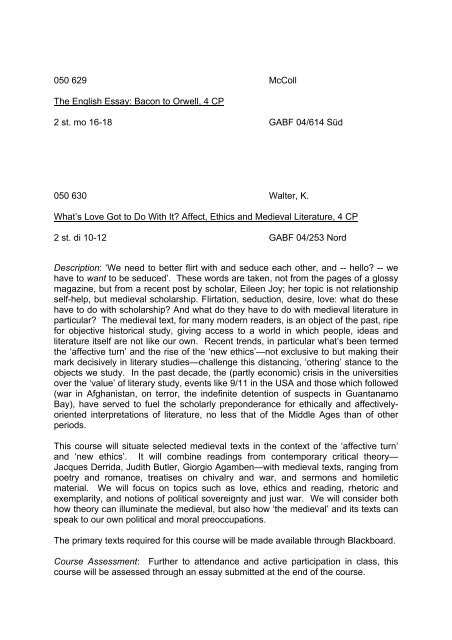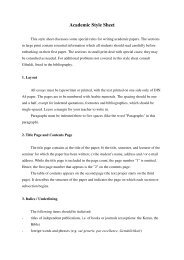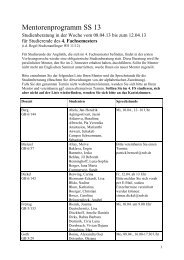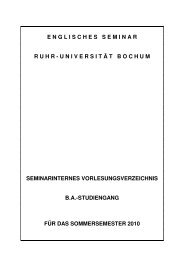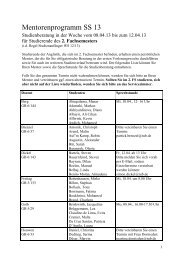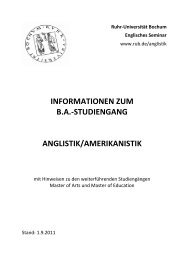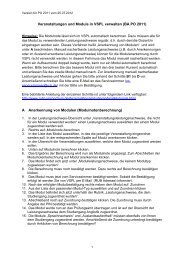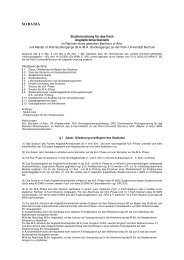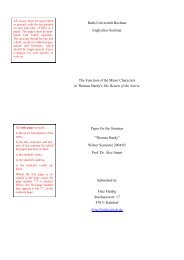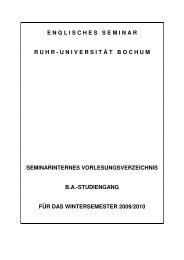Termine im WS 2012/13 - Englisches Seminar - Ruhr-Universität ...
Termine im WS 2012/13 - Englisches Seminar - Ruhr-Universität ...
Termine im WS 2012/13 - Englisches Seminar - Ruhr-Universität ...
You also want an ePaper? Increase the reach of your titles
YUMPU automatically turns print PDFs into web optimized ePapers that Google loves.
050 629 McColl<br />
The English Essay: Bacon to Orwell, 4 CP<br />
2 st. mo 16-18 GABF 04/614 Süd<br />
050 630 Walter, K.<br />
What’s Love Got to Do With It? Affect, Ethics and Medieval Literature, 4 CP<br />
2 st. di 10-12 GABF 04/253 Nord<br />
Description: ‘We need to better flirt with and seduce each other, and -- hello? -- we<br />
have to want to be seduced’. These words are taken, not from the pages of a glossy<br />
magazine, but from a recent post by scholar, Eileen Joy; her topic is not relationship<br />
self-help, but medieval scholarship. Flirtation, seduction, desire, love: what do these<br />
have to do with scholarship? And what do they have to do with medieval literature in<br />
particular? The medieval text, for many modern readers, is an object of the past, ripe<br />
for objective historical study, giving access to a world in which people, ideas and<br />
literature itself are not like our own. Recent trends, in particular what’s been termed<br />
the ‘affective turn’ and the rise of the ‘new ethics’—not exclusive to but making their<br />
mark decisively in literary studies—challenge this distancing, ‘othering’ stance to the<br />
objects we study. In the past decade, the (partly economic) crisis in the universities<br />
over the ‘value’ of literary study, events like 9/11 in the USA and those which followed<br />
(war in Afghanistan, on terror, the indefinite detention of suspects in Guantanamo<br />
Bay), have served to fuel the scholarly preponderance for ethically and affectivelyoriented<br />
interpretations of literature, no less that of the Middle Ages than of other<br />
periods.<br />
This course will situate selected medieval texts in the context of the ‘affective turn’<br />
and ‘new ethics’. It will combine readings from contemporary critical theory—<br />
Jacques Derrida, Judith Butler, Giorgio Agamben—with medieval texts, ranging from<br />
poetry and romance, treatises on chivalry and war, and sermons and homiletic<br />
material. We will focus on topics such as love, ethics and reading, rhetoric and<br />
exemplarity, and notions of political sovereignty and just war. We will consider both<br />
how theory can illuminate the medieval, but also how ‘the medieval’ and its texts can<br />
speak to our own political and moral preoccupations.<br />
The pr<strong>im</strong>ary texts required for this course will be made available through Blackboard.<br />
Course Assessment: Further to attendance and active participation in class, this<br />
course will be assessed through an essay submitted at the end of the course.


